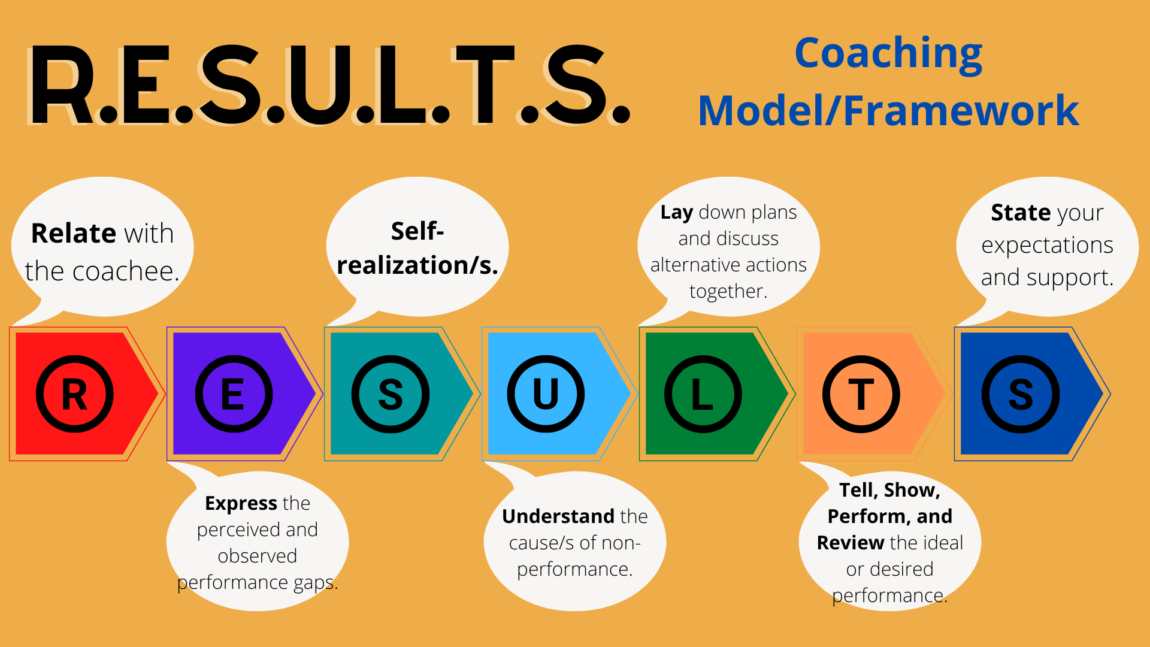THE R.E.S.U.L.T.S. COACHING MODEL: THE MODERN-DAY PROCESS FOR COACHING EMPLOYEES FOR IMPACT AND RESULTS
A COACHING TRAINING IN THE PHILIPPINES
A One-day Corporate EnterTRAINment on Coaching Peers and Subordinates
ENTERTRAINTMENT OVERVIEW:
This 2-day Coaching training in the Philippines is designed to equip participants with comprehensive coaching skills and techniques to help individuals improve their performance and achieve their goals within an organizational context.
Participants will learn how to build strong coaching relationships, identify performance gaps, facilitate self-realization, understand root causes of non-performance, and collaboratively develop action plans.
The training will include interactive coaching simulations, practical exercises, and engaging activities to reinforce learning.
ENTERTRAINTMENT GOAL:
The overall goal of this Coaching training in the Philippines is to enable participants to become proficient coaches who can inspire self-awareness, guide coachees in overcoming performance gaps, and foster positive change within their organizations through effective coaching techniques.
ENTERTRAINTMENT OBJECTIVES:
By the end of this 2-day Coaching Training in the Philippines, the trainees/participants should:
- Establish Effective Coaching Relationships: Participants will learn how to establish rapport with coachees, create a supportive coaching environment, set clear expectations, and introduce the coaching process to build trust and mutual understanding.
- Identify and Communicate Performance Gaps: Participants will develop the ability to assess coachees’ strengths and effectively communicate both perceived and observed performance gaps. They will understand the significance of differentiating between perceived and observed gaps and facilitate open communication with coachees.
- Facilitate Self-Realization: Participants will acquire techniques to guide coachees in self-realization, helping individuals recognize the impact of non-performance on themselves, others, and the organization. This step aims to foster self-awareness and responsibility.
- Collaboratively Develop Action Plans: Participants will learn how to work collaboratively with coachees to identify root causes of non-performance and co-create action plans. They will explore strategies and alternative actions to address performance gaps and achieve desired results.
ENTERTRAINMENT OUTLINE:
MODULE 1: RELATE WITH THE COACHEE
Here, it will be shared and applied how and why it is important for the coach to first warm up to the coachee and/or check how he/she is, set the tone of the conversation, identify with the person and know where he/she is coming from, set expectations, and give a preview of what will transpire during the session.
MODULE 2: EXPRESS THE PERCEIVED AND OBSERVED PERFORMANCE GAPS
As a starter, it is important that the coach first shares the coachee’s strengths as a transition to both the perceived and observed performance gaps of the person. There’s a big difference between a gap perceived and a gap observed and the coachee must be able to communicate them.
MODULE 3: SELF-REALIZATION/S
The coachee is being given an opportunity to affirm or negate the perceived and observed performance gaps communicated by the coach in order for the latter to check whether there’s an acknowledgement or denial from the person regarding the gaps in his/her performance. It’s about making the person realize the impact of non-performance to himself, to others, and to the company.
MODULE 4: UNDERSTAND CAUSES OF NON-PERFORMANCE
Once there’s an acknowledgment from the coachee, the next step is for the coach to understand from the person him/herself what he/she believes the root causes of his/her non-performance are. This is important for the coach to better understand where the difficulties are coming from in order to help the person better.
MODULE 5: LAY PLANS AND DISCUSS ALTERNATIVE ACTIONS TOGETHER
After the coach has determined using his own data and the coachees’ personal viewpoints and experiences what the root causes of non-performance are, it’s time to offer actions and plans that will be discussed and agreed upon by both parties.
MODULE 6: TELL-SHOW-PERFORM-REVIEW THE IDEAL OR DESIRED PERFORMANCE
As part of coaching the person, it is very helpful if the coach will role-model or demonstrate how the skills could be performed better, share what additional knowledge the person needs to acquire, and see how the person’s attitude towards work can be enhanced if it’s a motivation or an inspiration issue.
MODULE 7: STATE EXPECTATIONS AND (YOUR) SUPPORT
After an agreement has been reached as to the strategies and techniques that need to be tried by the coachee and the alternative actions that need to be resorted to as well, both parties must exchange expectations and show support to each other as a partnership for helping each other.
This training will be enhanced by a coaching simulation in which the whole team will be paired up to alternate coaching each other as an application and supporting icebreakers and energizers as well.


